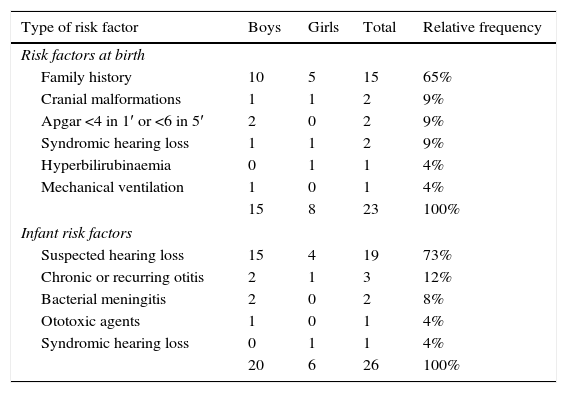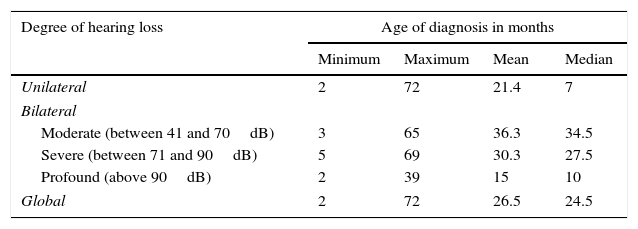Despite its importance, the existence of false negatives (patients who are told they hear well, but they have some degree of hipacusia) is rarely evaluated in programmes for early detection of hearing loss. The aim of this study is to determine the variables that can lead to a delayed diagnosis, especially the existence of false negatives and the lack of registration of risk factors.
MethodsA retrospective study of prevalence has been carried out, in which the medical records of children diagnosed with sensorineural hearing loss born within 2005 and 2012 in the health centres of study have been analysed.
ResultsOf the 32 children with sensorineural hearing loss, 16 passed the OAE, 12 did not passed the OAE, and in four they were not carried out. Of the children who passed the OAE, 57% have severe hearing loss. 66% of children with hearing loss presented a risk factor for hearing loss at birth, being the most frecuent family history of hearing loss, but only 7% of those with family history of hearing loss were included in the risk group.
ConclusionsThe results of the study indicate that the late diagnosis of hearing loss is related to the presence of false negatives to the OAE and the non-registration of risk factors.
A pesar de su importancia, la existencia de falsos negativos (pacientes a los que se les dice que oyen bien, pero en realidad son hipoacúsicos) no suele ser evaluada en los programas de detección precoz de hipoacusia. El objetivo de este estudio es determinar las variables que pueden a llevar a un retraso diagnóstico, en especial la existencia de falsos negativos así como la falta de registro de factores de riesgo.
MétodosSe ha realizado un estudio observacional retrospectivo de prevalencia, analizando las historias clínicas de los pacientes con hipoacusia neurosensorial nacidos entre 2005 y 2012 en las áreas de salud del estudio.
ResultadosDe 32 niños con hipoacusia neurosensorial, 16 pasaron las OEA, 12 no pasaron las OEA y a 4 no se les realizaron. De los pacientes con hipoacusia pero que pasaron las OEA, el 57% tiene una hipoacusia severa y/o profunda. El 66% de los niños con hipoacusia presentaban algún factor de riesgo de hipoacusia, siendo los antecedentes familiares de hipoacusia el más frecuente, pero solo el 7% de los que tenían antecedentes familiares fueron incluidos en el grupo de riesgo. La tasa de pacientes falsos negativos en el estudio es muy elevada.
ConclusionesLos resultados del estudio indican que el diagnóstico tardío de las hipoacusias infantiles en las áreas estudiadas está relacionado con la presencia de falsos negativos a las OEA y con la falta de registro de los factores de riesgo.









